 As the government announces further support for the UK's emerging graphene industry, James Baker from the National Graphene Institute says the emerging concept of a 'graphene city' can be a UK model for commercialising new scientific discoveries.
As the government announces further support for the UK's emerging graphene industry, James Baker from the National Graphene Institute says the emerging concept of a 'graphene city' can be a UK model for commercialising new scientific discoveries.
May 12th, 2014
Read more
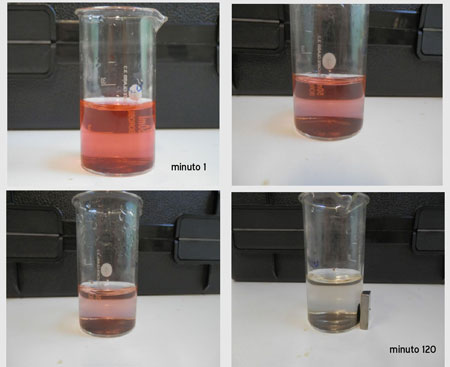 The nanostructures are coated in titanium oxide to which nitrogen has been added. This allows sunlight, rather than ultraviolet radiation, to trigger the process involving the chemical reaction and destruction of contaminants.
The nanostructures are coated in titanium oxide to which nitrogen has been added. This allows sunlight, rather than ultraviolet radiation, to trigger the process involving the chemical reaction and destruction of contaminants.
May 12th, 2014
Read more
 A new project at the National Physical Laboratory will develop methodologies to measure the radio-biological impact of gold nanoparticles, when used in combination with ionising radiation for enhancing radiotherapy treatments and medical imaging.
A new project at the National Physical Laboratory will develop methodologies to measure the radio-biological impact of gold nanoparticles, when used in combination with ionising radiation for enhancing radiotherapy treatments and medical imaging.
May 12th, 2014
Read more
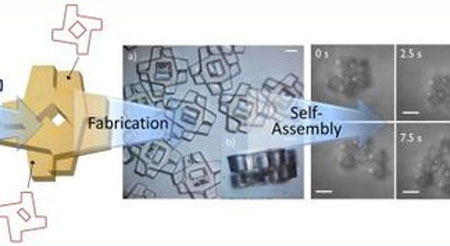 The microtiles are fabricated out of the superposition of two structural SU-8 layers featuring chiral copies of the same centro-symmetric pattern. They can coordinate laterally in water independently of their vertical orientation to form close-packed square lattice clusters.
The microtiles are fabricated out of the superposition of two structural SU-8 layers featuring chiral copies of the same centro-symmetric pattern. They can coordinate laterally in water independently of their vertical orientation to form close-packed square lattice clusters.
May 12th, 2014
Read more
The ERC awarded its 4000th grant to the NANOHEDONISM project, led by Spanish grantee Manuel Arruebo addresing injectable and biodegradable nanodrugs to relieve chronic pain.
May 12th, 2014
Read more
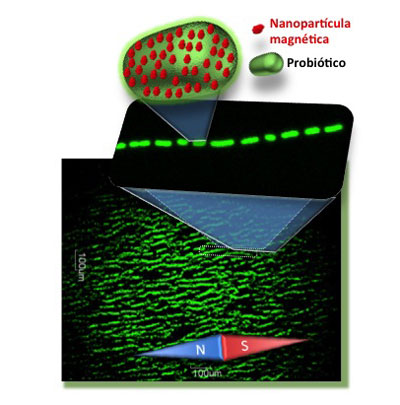 Scientists have successfully created magnetic bacteria that could be added to foodstuffs and could, after ingestion, help diagnose diseases of the digestive system like stomach cancer.
Scientists have successfully created magnetic bacteria that could be added to foodstuffs and could, after ingestion, help diagnose diseases of the digestive system like stomach cancer.
May 12th, 2014
Read more
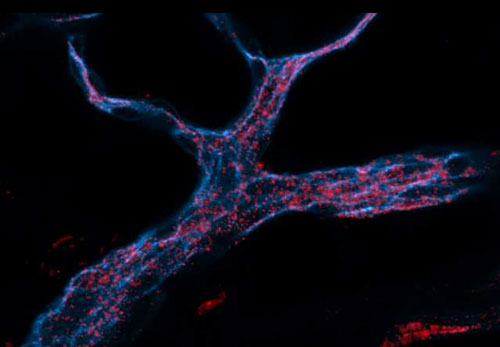 RNA carried by new nanoparticles can silence genes in many organs, could be deployed to treat cancer.
RNA carried by new nanoparticles can silence genes in many organs, could be deployed to treat cancer.
May 12th, 2014
Read more
Scientists have taken a large step toward making a fiber-like energy storage device that can be woven into clothing and power wearable medical monitors, communications equipment or other small electronics.
May 11th, 2014
Read more
 The ability to create conducting polymer films in a variety of shapes, thicknesses and surface properties rapidly and inexpensively will make growing and testing cells easier and more flexible, according to a team of Penn State bioengineers.
The ability to create conducting polymer films in a variety of shapes, thicknesses and surface properties rapidly and inexpensively will make growing and testing cells easier and more flexible, according to a team of Penn State bioengineers.
May 9th, 2014
Read more
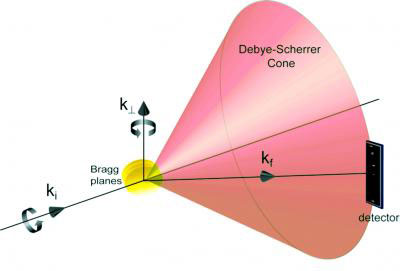 An international team of scientists has developed a new technique called rotational X-ray tracking (RXT). The researchers were successful in demonstrating the power of the new technique by using it to study small crystalline particles immobilized by the fact they form a colloidal gel under certain conditions.
An international team of scientists has developed a new technique called rotational X-ray tracking (RXT). The researchers were successful in demonstrating the power of the new technique by using it to study small crystalline particles immobilized by the fact they form a colloidal gel under certain conditions.
May 9th, 2014
Read more
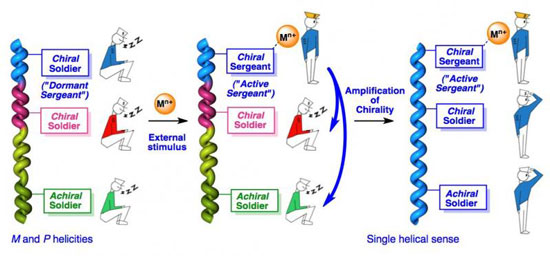 Researchers control the activation and deactivation of the 'sergeants-soldiers effect' in helical polymers by the addition of metal ions.
Researchers control the activation and deactivation of the 'sergeants-soldiers effect' in helical polymers by the addition of metal ions.
May 9th, 2014
Read more
Researchers have developed a high-quality continuous graphene oxide thin film that shows potential for ultrafast telecommunications.
May 9th, 2014
Read more
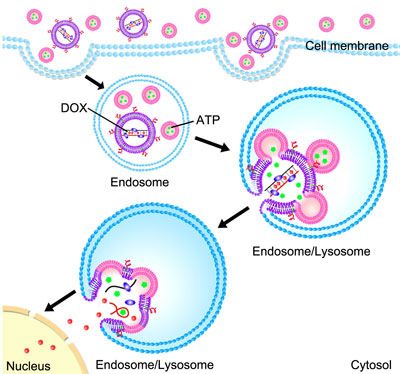 Biomedical engineering researchers have developed a nanotechnology anti-cancer drug delivery method that essentially smuggles the drug into a cancer cell before triggering its release. The method can be likened to keeping a cancer-killing bomb and its detonator separate until they are inside a cancer cell, where they then combine to destroy the cell.
Biomedical engineering researchers have developed a nanotechnology anti-cancer drug delivery method that essentially smuggles the drug into a cancer cell before triggering its release. The method can be likened to keeping a cancer-killing bomb and its detonator separate until they are inside a cancer cell, where they then combine to destroy the cell.
May 9th, 2014
Read more
Researchers have developed a simple method for controlling the 'doping' of carbon nanotubes (CNTs), a chemical process that optimizes the tubes? properties. The method could improve the utility of doped CNTs in a number of nanotechnologies and flexible electronics, including CNT-silicon hybrid solar energy cells.
May 9th, 2014
Read more
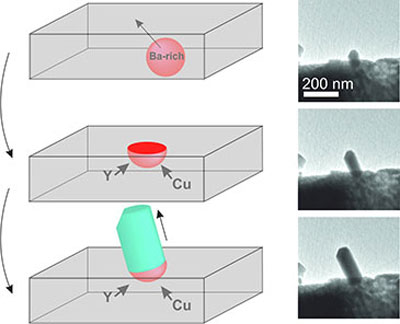 A mechanism of growth of anisotropic metal oxides that was predicted 20 years ago has been observed for the first time by researchers at the University of Bristol.
A mechanism of growth of anisotropic metal oxides that was predicted 20 years ago has been observed for the first time by researchers at the University of Bristol.
May 9th, 2014
Read more
Scientists have shown for the first time the maximum theoretical limit of energy needed to control the magnetization of a single atom. The fundamental work can have great implications for the future of magnetic research and technology.
May 9th, 2014
Read more
 As the government announces further support for the UK's emerging graphene industry, James Baker from the National Graphene Institute says the emerging concept of a 'graphene city' can be a UK model for commercialising new scientific discoveries.
As the government announces further support for the UK's emerging graphene industry, James Baker from the National Graphene Institute says the emerging concept of a 'graphene city' can be a UK model for commercialising new scientific discoveries.










 Subscribe to our Nanotechnology News feed
Subscribe to our Nanotechnology News feed